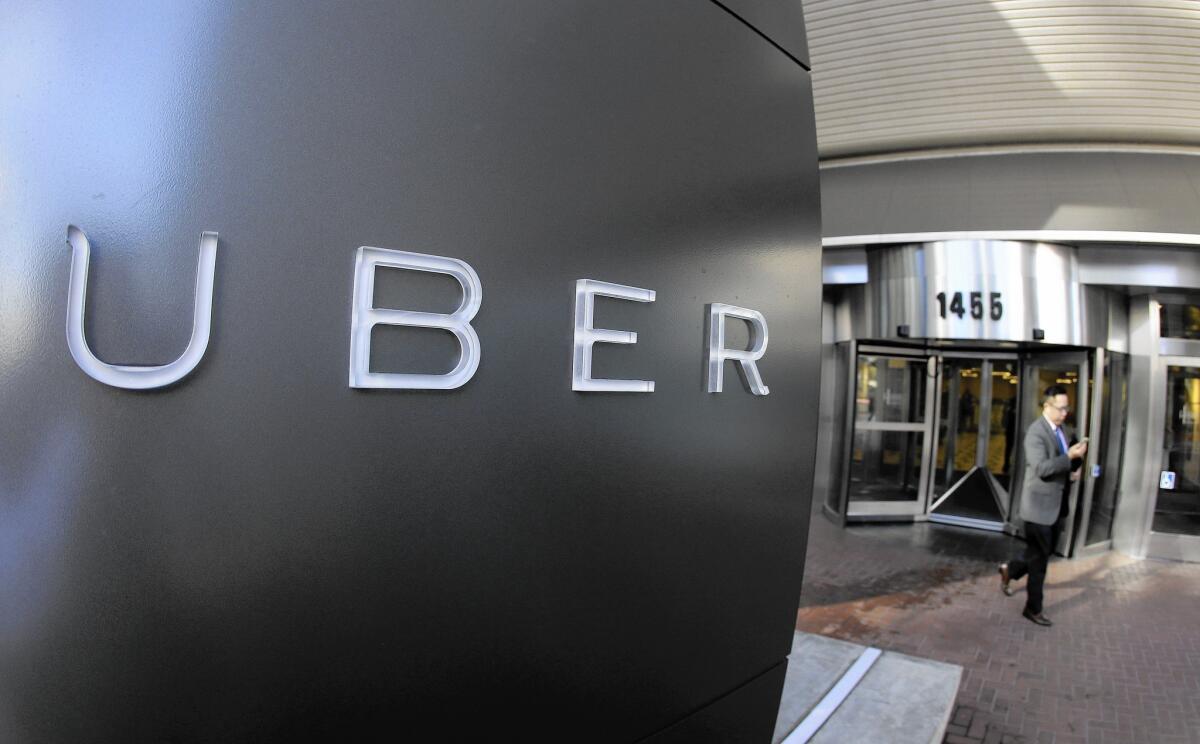Uber will give people whose felonies have been reduced to misdemeanors a chance to drive

Uber will announce an initiative that could help clear the path for convicted felons whose crimes are reduced to misdemeanors to drive for the ride-hailing platform. Above, the company’s headquarters in San Francisco.
Reporting from San Francisco — Almost anyone can drive for Uber: actors, musicians, retirees, stay-at-home moms. One group that has never been allowed on the platform is people who have been convicted of felonies.
That could soon change.
On Wednesday, the San Francisco company will announce an initiative that could help clear the path for convicted felons whose crimes are reduced to misdemeanors to drive for the ride-hailing platform.
See more of our top stories on Facebook >>
The move could mean a sizable number of new drivers for Uber, a boon at a time when it is rapidly scaling up to meet huge demand and needs as many people behind the wheel as it can get. But it’s also a potential publicity headache for a company that has faced accusations of lax driver screening and reports of unsafe or inappropriate driver behavior.
Under Uber’s long-standing safety policies, drivers who have committed felonies are automatically disqualified from driving for the on-demand transportation company. But its background check process also rules out drivers who may qualify to drive under Proposition 47, a California ballot measure passed in 2014 that reclassifies certain felonies as misdemeanors.
Crimes that can be reclassified include personal use of illegal drugs, shoplifting, writing a bad check and receiving stolen property for which the value does not exceed $950.
The company said it will begin proactively notifying disqualified drivers about Proposition 47 so that if they choose, they can apply to have their cases reconsidered by the court.
It will also refer applicants to Defy Ventures, an organization that offers employment training to people with criminal records. If the petition is successful and a person’s criminal record is scrubbed of felonies, he or she could be approved to drive for Uber.
Proposition 47 remains contentious and Uber’s involvement is likely to raise a few eyebrows, given its history of making the news because of its safety policies.
Taxi companies and the San Francisco and Los Angeles district attorneys have in the past called into question the platform’s safety, describing Uber’s criminal background checks as “completely worthless” because its driver screenings use courthouse records instead of an FBI database and fingerprinting technology called Live Scan.
California taxi companies use Live Scan to screen their drivers.
According to Uber’s chief security officer, Joe Sullivan, the company will continue to disqualify drivers with felonies on their records, and it has “zero tolerance for DUI or any intoxication-related misdemeanors.”
Anyone with a record of physical or sexual violence and reckless driving would also be disqualified, Sullivan said. “We think those are the types of categories most indicative of a safety risk and those are the ones we’ll focus on.”
Troy Vaughn, chairman of the Los Angeles Regional Reentry Partnership, an organization that works with communities and companies to help former prisoners reenter society, described Uber’s involvement as “a game changer” and praised the company for having “compassion for community.”
“This relates to helping individuals recover their lives,” Vaughn said. “Everyone makes mistakes. Are we saying now as a society we will not afford a person an opportunity because he made a mistake when he was still learning how to be a man? I think we want to send a different message.”
Not everyone sees Uber’s announcement as a purely philanthropic move, though. Evan Rawley, an associate professor of business at Columbia Business School, said the initiative looks more like a ploy by Uber to broaden its driver pool.
“Uber is in a race right now with Lyft to sign up as many drivers as possible … so this is an attempt by them to reach drivers that maybe Lyft has overlooked,” he said. “I’m sure they can pitch it as [a community benefit], but it’s probably not the business rationale.”
Uber’s Sullivan, however, countered: “It’s not going to materially change the number of drivers coming onto the platform.”
The news garnered mixed responses from Uber customers, with some wanting more transparency from Uber about who is driving them.
“I’m all for rehabilitating people back into the workforce, but it makes me uncomfortable,” said Uber customer Stephanie Lim, 26, who lives in Oakland. “I put my personal safety in the hands of ride-sharing apps, and I feel this puts me at risk a bit.”
Others were all for the initiative, saying they were happy for the people who now have greater employment opportunities.
“It sounds to me like those people didn’t need to be classified as felons in the first place — certainly not in a way that ought to disqualify them from driving me to the airport,” said Adam Rippon, 35, a regular Uber customer and Bay Area resident.
“I mean, heck, my dad bought my Super Nintendo with a bad check, and I got a ride in his car literally all the time.”
Twitter: @traceylien
ALSO
How Snapchat is targeting the over-35 crowd
Shanghai Disney resort set to open June 16
Hugh Hefner’s Playboy Mansion lists for $200 million







